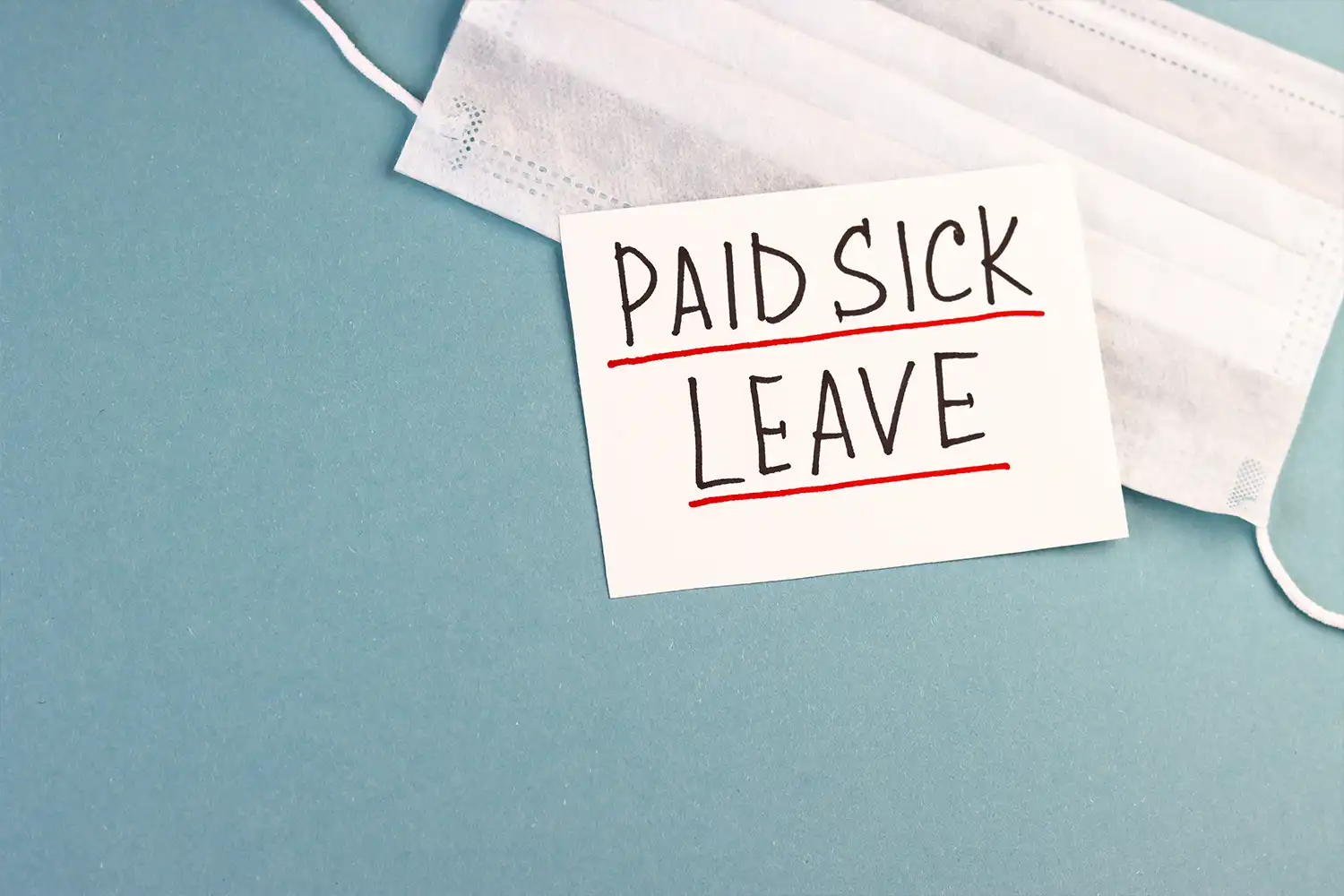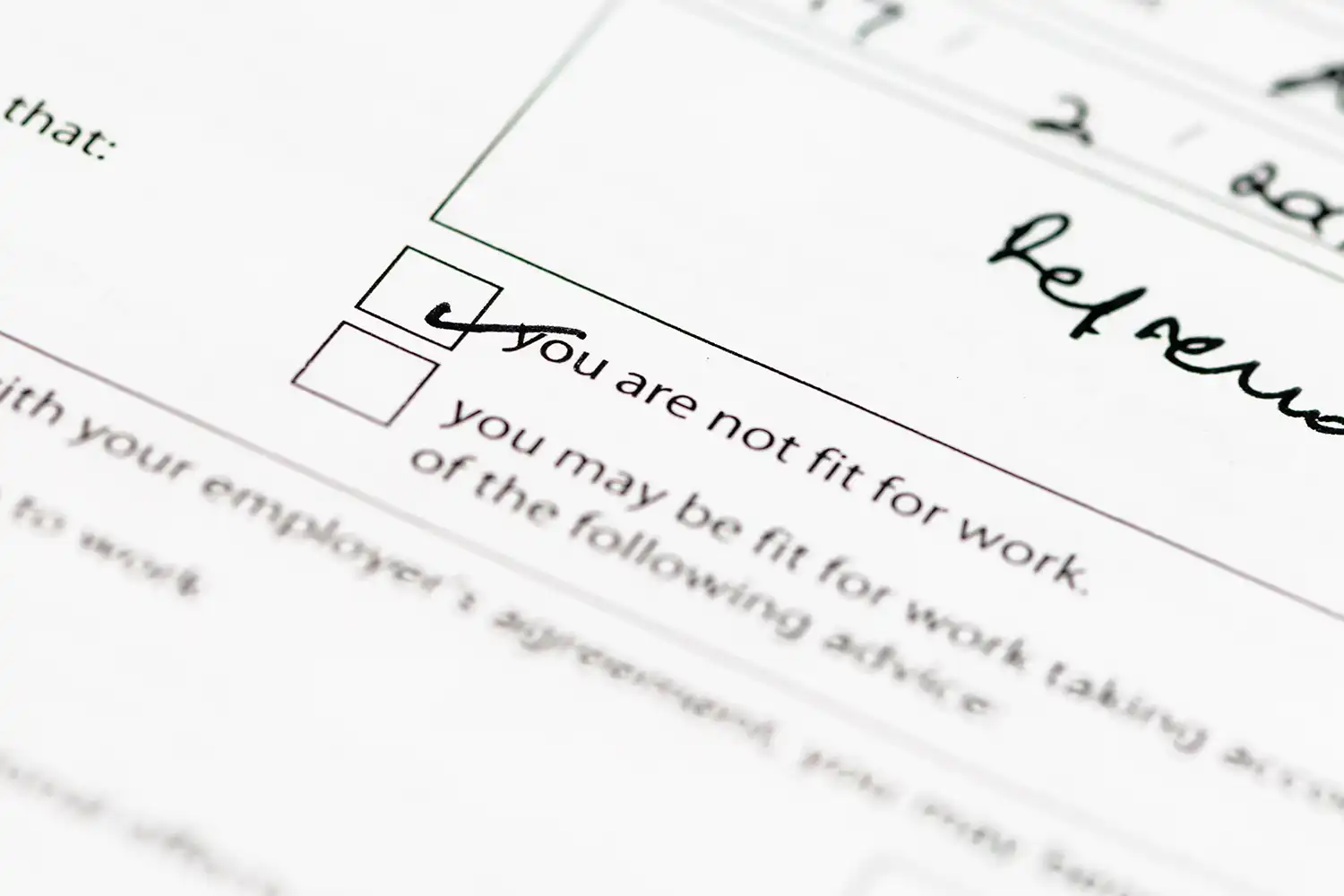Sick pay: A guide for employees
It’s important to be aware of your sick pay entitlement since you’re likely to need time off work due to ill health at some point. Our sick pay guide outlines your key rights in the event of you becoming sick and being unable to work.
Rated 4.8 Stars in Over 1,000 Reviews
What is sick pay and how much should you get?
Sick pay is the amount of money you will receive when you’re absent from work due to illness, injury, or disability. The amount of money you get depends on whether you receive contractual sick pay or Statutory Sick Pay (SSP) – see below. Your overall entitlement should be summarised in your contract of employment.
What is Statutory Sick Pay?
SSP is paid to you by your employer when you are off work sick. By law, SSP must be paid to all those who are eligible for up to 28 weeks, with a maximum payout of £116.75 a week (from 6 April 2024)
If eligible, you can claim SSP even if it is not included in your contract. You should be able to claim SSP if you have:
- Already begun work with your employer
- Been off work sick for at least 4 days in a row (which also includes non-working days)
- Average earnings of at least £123 every week
- Notified your employer and supplied evidence of incapacity for work (see below)
The above also applies to casual, agency and zero-hours workers who meet the required eligibility requirements.
What is contractual sick pay?
Contractual sick pay is money paid to you by your employer when you are off sick. If your employer is willing and able to pay it, details will be outlined in your contract of employment, or in a separate company sick pay scheme.
You will typically be eligible for contractual sick pay after you have been employed for a minimum period of time (eg after your probationary period).
Once you become eligible, you will usually receive your normal salary when you are off sick for a given number of weeks, and then after that, the amount you receive will reduce for a further period.
Some company sick pay schemes pay your normal salary for a given period of time, less the amount of SSP.
The amount offered by your employer as contractual sick pay cannot be less than SSP and you will not receive it in addition to SSP. Whether you receive contractual sick pay or SSP should be stated clearly in your contract of employment.
The amount of time you will receive contractual sick pay when you are off sick should also be clearly stated either in your contract or in your company sick pay scheme document.
Do you get paid if you’re sick during your notice period?
If you are on sick leave whilst working your notice period, you are entitled to either your normal rate of pay or SSP. Which one of those you receive should be stated in your contract of employment or employer’s sick leave policy (see below).
See also our guide on notice period when leaving your employment

Should my employer have a sick leave policy?
Your employer should state their sick leave policy in your work contract or in their employees’ handbook or equivalent. However, employees have no absolute entitlement to contractual sick pay, as this is made available only at your employer’s discretion.
What should be in a sick leave policy?
A sick leave policy should include things such as:
- How employees can take sick leave, whether it’s related to sudden illness, recovering from an accident, attending a medical appointment or receiving psychological care.
- Who to notify when you start taking sick leave and during your absence.
- The type of proof of incapacity needed (self-certification/fit notes).
- The number of paid and unpaid sick days available each year and where it is paid, whether this will be contractual or SSP.
- Dismissal procedures related to long-term absence through sick leave (typically over 28 weeks) and what this process entails (see below), including a
- How you can appeal against decisions taken by your employer about your sick leave (See our guide on appeals by employees).
What evidence of being sick do I have to give my employer?
There are two main types of evidence that you can present to your employer when you need to take time off from work because of sickness, as outlined below.
Self-certification
If you are off work sick for less than 7 days:
- You should follow the company guidelines on self-certification and inform your employer within the stated time period that you cannot attend work due to illness.
- You do not need to provide a doctor’s fit note as the first 7 days are classed as self-certification.
If you are off work for longer than 7 days you will have to request a fit note from your doctor.
Fit notes
Fit notes are issued by doctors after they have assessed whether or not you are fit to return to work after 7 days’ absence.
Can a doctor refuse to give you a fit note?
Fit notes – also commonly referred to as ‘sick notes’ or ‘doctors’ notes’ – are provided at the discretion of the individual medical doctor. That means a doctor can refuse to issue one if they believe you are fit to work.
Before requesting a fit note, it is a good idea to document the start of your symptoms, what they have been, and their severity. This will give the doctor a clearer picture of your health since you first fell ill.
A fit note will state that you are either not fit for work, or might be fit for work. If the latter, the doctor will usually give brief details of the type of work you may be able to do. The note can highlight specific tasks the person may be fit to carry out and others that may not be suitable until they fully recover.
Can an employer override a doctor’s sick note?
When you produce a sick note for your employer, they hold the final decision as to whether or not it will be accepted.
The government has previously informed employers that any instructions provided by a doctor can be deemed as advice, and it is for the employer to ultimately make the final decision on whether the employee returns to work or not.

Telling your employer you’re sick
When do you have to tell your employer you’re sick?
The company sick policy should state when you need to tell your employer that you are sick and unable to work. This may vary from case-to-case, but this generally occurs on the morning of the workday in question.
If you are absent for a number of days consecutively, you are likely to be asked to provide regular updates to a named colleague or manager about your health condition.
When should you submit your doctor’s fit note?
If you are absent from work longer than 7 days you will need to get a fit note from your doctor. Your employer may wish to see the fit note as soon as it has been issued to assess whether or not they want you to return to work.
The company sickness and sick leave policy should state when the fit note has to be submitted. If you are off longer than 7 days and have been authorised by your employer, you may have to submit it as soon as you return to work. In the interim, they may ask for a photographed copy to be sent electronically.
How long can you be on sick leave before you can be dismissed?
An employee is generally considered to be on long-term sick leave if they are absent for more than 28 consecutive weeks, although different employers may have different policies on this.
You can be dismissed while on sick leave, although this should only be done with good reason. This includes if you have been on long-term sick leave or persistent sick leave that makes it impossible for you to do your job.
However, the company must demonstrate that they have tried to support you before enacting dismissal proceedings. For example, if your illness is a result of the job you are doing, they will need to review your duties and see what can be changed or altered. They must also give you a ‘reasonable’ amount of time to recover from being ill.
The steps that an employer should take before dismissing you for long-term sick leave are detailed in Acas’s Code of conduct on dismissals.
If your employer fails to take the above steps or doesn’t undertake them properly, you may have a valid legal claim against them for unfair dismissal.
Your right to return to work after sickness
Following sickness, you have a right to return to work immediately and to resume your role with your usual wage or salary. When you’ve been off sick for a short time, this shouldn’t present you with any difficulties.
However, in cases of serious and/or long-term sickness, you and your employer might agree that a phased return to work would be best for both parties, as outlined below.
What’s a phased return to work after sick leave?
A phased return to work is when an employee returns to work after long-term absence due to sickness and is gradually reintroduced back to their full work responsibilities.
It’s not an automatic right but is a way of re-integrating you back into work so that it won’t adversely affect your health. It is often agreed to as a “reasonable adjustment” if the employee is considered to have a disability under the Equality Act 2010.
It could include working reduced hours, lighter duties or a slightly different role for a certain period.
Any plan used for a phased return to work should be stated in writing and agreed upon by both employee and employer. The advice of a medical doctor or occupational health adviser may also need to be sought.
A review date should be included within the plan, so both parties can discuss how successful the return to work has been and whether the current arrangements need to be scaled up or down.

Sickness and holidays
Issues around sick leave and holidays can often cause friction between you and your employer. So here we present some questions about the topic, together with answers that you need to know if you are to assert your rights in any disagreement with your employer about your entitlement.
Can you accrue holiday entitlement whilst on sick leave?
When you’re off work due to sickness, you continue to accrue (in other words, build up) your statutory annual holiday entitlement, which is 28 days if you are a full-time employee.
You can ask to take your paid holiday when you’re on sick leave. For example, you may not be well enough to work, but may be able to take and benefit from a holiday, or be on reduced pay and annual leave would be on full pay.
If your employer offers more than the statutory holiday entitlement, they may have different rules on how much of that additional entitlement you can accrue. This information should be stated in your employment contract or in your company’s handbook for employees.
If you can’t take your full holiday entitlement due to sickness, you are entitled to carry over up to 20 days to the following year. (see gov.uk Holiday entitlement rights for more)
What happens if you become sick while on holiday?
If you become sick while on holiday leave and you want to be treated as off sick instead of being on holiday, you need to let your employer know as soon as practicable.
The advantage of doing this is that you should be able to save the days you were off sick as holiday entitlement which you can take on another occasion when you are in good health.
The drawbacks include the fact that you may not receive your full pay when you are on sick leave and – depending on your location when you are sick – you may have problems getting a doctor’s note if one is needed.
What practical steps should you take if you’re sick on holiday?
If your illness during your holiday leave means you will not be able to return to work as expected after your holiday, you should make a record of your symptoms and general health as it may be needed if you have to request a fit note 7 days later.
If you don’t want the time you were sick during your holiday leave to be formally counted as sick leave, and you want to take sick leave following the end of your holiday leave, you should get in touch with your employer a day or two before you were originally due to return to work to let them know you have fallen ill and that you will not be returning as expected.
You can then update them on the morning of your expected return date to let them know that you will be taking time off sick.
Having problems at work because of sick leave?
Get in touch
Next steps
Is your employer treating you badly, failing to pay you properly because of your illness, or trying to dismiss you because of it?
If this sounds like your situation and you need specialist advice on how to deal with it, get in touch with Monaco Solicitors. We are employment law specialists, representing employees only and have successfully represented hundreds of employees whose problems at work began with issues relating to sick leave and sick pay.
If you would like a no-obligation consultation, do contact us:
- Via this link
- Phone 020 7717 5259
- Email communications@monacosolicitors.co.uk.